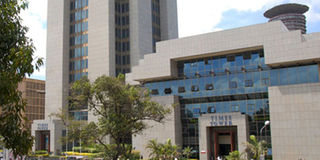Experts want an overhaul of law on capital gains tax

The Kenya Revenue Authority headquarters at Times Tower in Nairobi. PHOTO | FILE |
What you need to know:
- The government has set January 1, 2015 when the new tax takes effect, but the experts say it contains some grey areas due to lack of clarity.
- President Kenyatta signed a five per cent capital gains tax into law in September
Tax experts have warned that failure to amend the law on capital gains tax in its entirety could impede the smooth implementation of the measure meant to raise more revenue.
The government has set January 1, 2015 when the new tax takes effect, but the experts say it contains some grey areas due to lack of clarity.
A capital gains tax is assessed on any gain in value from the sale of land, buildings or shares that are being transferred from one person to another.
A capital gains tax was in effect until 1985 when it was dropped ostensibly to encourage growth in the real estate and capital markets. It has been introduced as the government moves to increase revenue to meet its development objectives.
Experts have expressed support for the new tax but have voiced concern that government failure to change Schedule 8 to accommodate changes in the economy, such as inflation levels, will make it difficult to implement.
“An obsolete clause in Schedule 8 puts land at Sh30,000 (value of land in 1985) which is the base value. Such land has escalated in cost and is now worth millions. The law has not factored in the change in economic environment, which includes inflation rates,” PKF Taxation Services Ltd consultant Mr Nahashon Mathenge said.
President Kenyatta signed a five per cent capital gains tax into law in September, something that some investors claim could lead to a slowdown in investment in property, equities and oil and affect the mining industry.
But others have praised the reintroduction, arguing that the economy has profoundly changed since 1985, and the tax is unlikely to negatively affect the country’s attractiveness as an investment destination.
They argue that the proposed rates are low compared to those of Kenya’s neighbours: Uganda’s rate is 30 per cent and Tanzania’s is 20 per cent.





